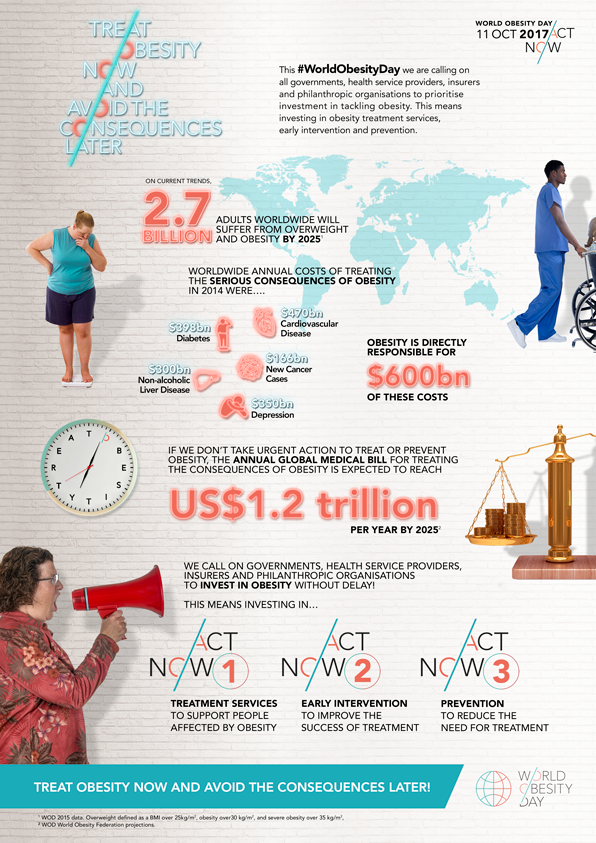
News & Events
Mobilising Partnerships to Tackle Obesity

By Food Industry Asia (FIA)
On the occasion of World Obesity Day on 11 October 2017, Food Industry Asia (FIA) reflects on the growing public health issue of obesity, and how partnerships between the public and private sectors can deliver successful outcomes to deal with the problem.
Alarming statistics from studies carried out by the World Health Organization (WHO) indicate that 1.9 billion people worldwide are considered overweight and obese, while another 925 million people are suffering from hunger. On top of this, at least 2.8 million people die every year, from complications related to being overweight or obese. More so than infectious diseases and other traditional healthcare issues, obesity is fast becoming the top risk factor targeting public health. As the issue grows in Asia, a unique public-private partnership, the Asia Roundtable on Food Innovation for Improved Nutrition (ARoFIIN), is driving food innovation to tackle obesity in the region.
The impact of obesity on people’s lives, healthcare systems and economies is being debated in the news media by members of academia, industry, governments and regulatory bodies, almost on a daily basis. Punitive measures like proposed sugar taxes, or more sustained and planned efforts like the restriction of marketing to children, are among a raft of measures debated.

Image credit: World Obesity Federation
“Tackling obesity in ASEAN: Prevalence, impact, and guidance on interventions”, a recently launched study by the Economic Intelligence Unit (EIU) and commissioned by ARoFIIN, shows that obesity and overweight rates have been steadily increasing in Association of Southeast Asian Nations (ASEAN) countries over the last three decades, not just in higher-income nations, but also in low- and middle-income ones. Across the region, Malaysia ranks first in terms of overweight and obesity prevalence rate – nearly 50 per cent of its adult population faces these problems.
While there has been a sharp growth in obesity rates in Asia, the number of people who suffer from hunger also remains steady. This double burden of obesity and undernutrition has become an emerging threat to health and healthcare systems in the region. It requires immediate action, which needs to be driven not only by governments and regulators, but by innovations in the food industry driven by the private sector, as well as scientists and academics, operating in the region.
FIA is a non-profit industry association that was established with the goal of harnessing the expertise of major food & beverage companies, and responding to the region’s complex challenges in food safety, regulatory harmonisation and effective approaches to public health. With Health & Nutrition as one of its cornerstones, FIA advocates a multi-stakeholder approach to addressing the dual burden of over-consumption and undernutrition. As part of its efforts to combat this double burden, FIA is working to raise awareness of the steps the industry is taking in Asia to help address this complex challenge, and building effective partnerships between the private sector and governments throughout the region to meet specific public health goals.
Singapore is home to ARoFIIN, which is convened by Singapore government agencies, including the Health Promotion Board (HPB); the Agency for Science, Technology and Research (A*STAR); the Singapore Institute for Clinical Sciences (SICS); and FIA.
Set up at the beginning of 2015, ARoFIIN is about leveraging public-private partnerships, to bring together a range of experts from academia, government, industry and civil society sectors, from across the Asian region, to initiate and sustain regional, multi-stakeholder dialogue on the role of food innovation in tackling obesity and chronic disease in the region.
This group of key decision-makers works toward fostering a conducive forum to support dissemination of science-based information on the causes and drivers of obesity and chronic disease, as well as to improve clarity on the barriers and enablers for food innovation, as well as research and development (R&D) in the region. ARoFIIN leverages effective public-private partnerships and stimulates scalable, cost-effective and multi-stakeholder strategies that seek to drive food innovation and positive change in consumer behaviour.
“To effectively tackle a global issue like obesity, which is becoming more prevalent in Asia, along with undernutrition, collaboration between multiple stakeholders – particularly public-private partnerships – are vital,” says Mr Matt Kovac, Executive Director of FIA. “Public-private partnerships like ARoFIIN presents us with a great opportunity to bring a diverse range of multi-disciplinary experts to the table,” he added.
FIA believes the food industry has an important role to play in participating in and driving forward initiatives that tackle obesity – like ARoFIIN. Recognising that healthy eating is a key factor in the fight against the double burden, as well as non-communicable diseases (NCDs) such as diabetes and hypertension, FIA’s members share common values on the responsible promotion of balanced diets and lifestyles. FIA members continuously improve product offerings to create products that offer healthier options with more whole grains and fibre, more calcium, vitamins and minerals, more low-fat dairy, more vegetables and fruit, reduced sodium, less fat, less sugar and fewer calories.
FIA believes that the more effective measures, especially those with long-term impact, to combat obesity are those aimed at influencing the behaviour and habits of consumers, which can be achieved with comprehensive policy actions and public education, prevention tactics, and promotion of healthy lifestyles. From an industry perspective, this entails innovation, product reformulation, portion control, restrictions on the marketing of certain foods and beverages to children under 13, promotion of nutrition literacy and labelling, and public education on diet and the importance of physical activity. Achieving all of this requires the private sector to work closely with public institutions and other stakeholders.
As World Obesity Day this year shines a light on the importance of investments from governments, health service providers, insurers and philanthropic organisations in obesity treatment services – particularly early interventions, FIA believes it is important to recognise that multi-sectorial, multi-stakeholder partnerships like ARoFIIN can play an increasingly important role in the debate on the impact of obesity on people’s lives, healthcare systems and economies globally and in Asia.

